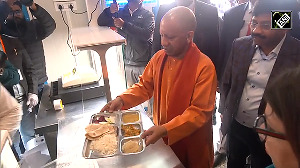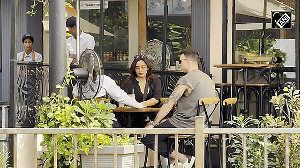The free run at automated teller machines might end soon, with banks petitioning the Reserve Bank of India to put curbs on cash withdrawals at third-party ATMs.
Representatives from the Indian Banks Association, who met central bank officials late last month to make a case, said RBI had accepted most of their suggestions and these are likely to come into effect soon.
Since April 1, customers have been allowed to withdraw cash and check account balances without having to bear the interchange fee. The burden was earlier passed on to bank clients.
After witnessing a surge in number of transactions but a fall in the ticket value of each transaction, banks have sought modifications in the free ATM rule. Chief among their suggestions is the imposition of a limit of Rs 10,000 per withdrawal when customers use a third-party ATM and a cap on the number of free third-party transactions at five a month.
Sources, however, said RBI rejected the suggestion to impose a minimum withdrawal limit per third-party ATM transaction.
Whenever a customer does a third-party ATM withdrawal the customer's bank, or the issuing bank, has to pay an interchange fee of Rs 18 to Rs 20 to the acquiring bank. This fee was earlier borne by the customer. Some big banks such as ICICI Bank are losing Rs 4 crore to Rs 5 crore a month because more of their own customers are using third-party ATMs. In contrast, State Bank of India, which has the largest network, said the free-use policy has been cash-neutral because the proportion of debit cards to ATM was optimum.
Banks have also proposed that they be allowed to pass on the interchange cost to customers withdrawing funds from current accounts. Banks have argued that current accounts, unlike savings bank accounts, do not have a minimum balance requirement and money deposited in such accounts does not earn interest.
Bankers said customers are making heavy withdrawals from current accounts. The disadvantage for banks is that not only do they have to pay for the customer using another bank's ATM but also have to deal with a low float, or balance, on the account.
The suggestion to cap the number of free third party transactions is meant to stem the losses of banks on account of interchange fees.
Some public sector banks were having problems replenishing ATMs at remote locations with cash, according to a senior bank executive. The proposal to impose an upper limit of Rs 10,000 per transaction seeks to curb this problem. At present, the amount of cash a customer can withdraw from an ATM at one go differs depending on the policy of each individual bank. "Although about 95 per cent of withdrawals are for less than Rs 10,000 some public sector banks were facing problems of excessive withdrawals. This will also help banks earn interchange revenue since a single large withdrawal will have to be split over two transactions," the executive said.








 © 2025
© 2025